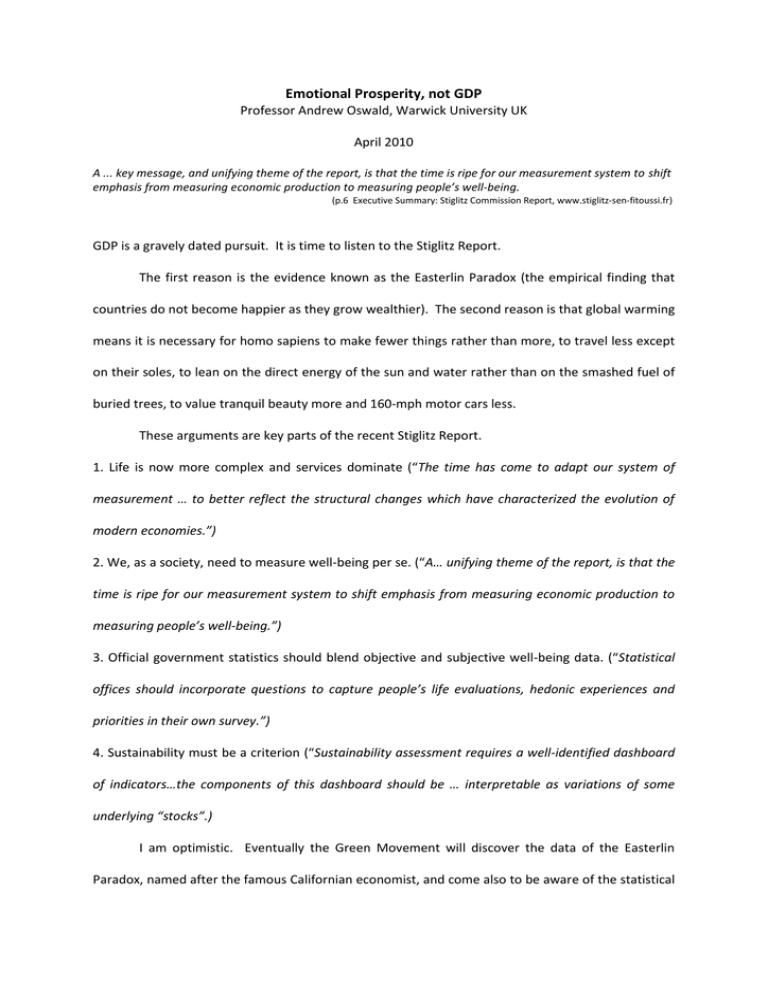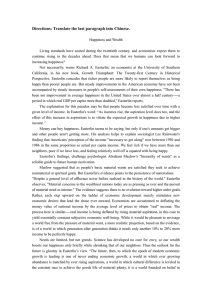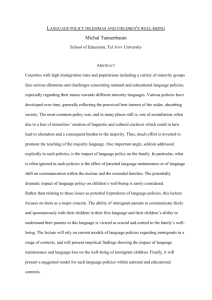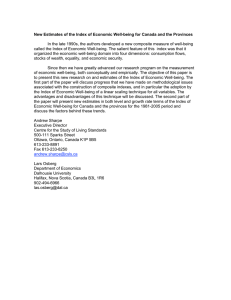Emotional Prosperity, not GDP Professor Andrew Oswald, Warwick University UK April 2010
advertisement

Emotional Prosperity, not GDP Professor Andrew Oswald, Warwick University UK April 2010 A ... key message, and unifying theme of the report, is that the time is ripe for our measurement system to shift emphasis from measuring economic production to measuring people’s well-being. (p.6 Executive Summary: Stiglitz Commission Report, www.stiglitz-sen-fitoussi.fr) GDP is a gravely dated pursuit. It is time to listen to the Stiglitz Report. The first reason is the evidence known as the Easterlin Paradox (the empirical finding that countries do not become happier as they grow wealthier). The second reason is that global warming means it is necessary for homo sapiens to make fewer things rather than more, to travel less except on their soles, to lean on the direct energy of the sun and water rather than on the smashed fuel of buried trees, to value tranquil beauty more and 160-mph motor cars less. These arguments are key parts of the recent Stiglitz Report. 1. Life is now more complex and services dominate (“The time has come to adapt our system of measurement … to better reflect the structural changes which have characterized the evolution of modern economies.”) 2. We, as a society, need to measure well-being per se. (“A… unifying theme of the report, is that the time is ripe for our measurement system to shift emphasis from measuring economic production to measuring people’s well-being.”) 3. Official government statistics should blend objective and subjective well-being data. (“Statistical offices should incorporate questions to capture people’s life evaluations, hedonic experiences and priorities in their own survey.”) 4. Sustainability must be a criterion (“Sustainability assessment requires a well-identified dashboard of indicators…the components of this dashboard should be … interpretable as variations of some underlying “stocks”.) I am optimistic. Eventually the Green Movement will discover the data of the Easterlin Paradox, named after the famous Californian economist, and come also to be aware of the statistical evidence on declining emotional prosperity that I describe below. Although fine young scholars like Betsey Stevenson and Justin Wolfers doubt the veracity of it, they are heavily outnumbered: the weight of published evidence is in line with Richard Easterlin’s paradox. Moreover, Stevenson and Wolfers themselves agree that the USA, perhaps the iconic GDP-chasing nation, is not becoming happier through time. If we look at broader measures of psychological well-being, the newest longitudinal research suggests there are reasons to be more pessimistic than Easterlin. Although further research evidence needs to be collected, this is what we currently know: Worryingly, emotional prosperity and mental health appear from the latest data to be getting worse through time. This disturbing conclusion emerges from these seven studies: Sacker and Wiggins (2002) Hodiamont et al (2005) Verhaak et al (2005) Green and Tsitsianis (2005) Wauterickx and Bracke (2005) Oswald and Powdthavee (2007) Sweeting et al (2009). Why? We are not yet certain. But, first, humans are animals of comparison (some of the newest evidence, from brain scans, is reported in Fliessbach et al 2007). What I want subconsciously is to have three zoomy BMWs and for my colleagues in the office corridor at work to have mere rusting, spluttering Fords. Unfortunately, the tide of economic growth lifts all boats, so where having three glamorous motor cars was unusual, eventually it becomes the norm, and any relative gains are thereby neutralized. Second, people choose things -- like high-pressure kinds of work and long commutes away from their families and their dogs and their fishing buddies -- that, despite what they think, will often not make them happier. Economists have ignored the research on ‘affective forecasting mistakes’ by psychologists like Daniel Gilbert; they need to wake up to it. 1 Unsurprisingly, the citizens of the rich nations find it difficult to grasp that higher Gross Domestic Product from this point onwards will not make society happier. Like people in earlier times who could not conceive of themselves as creatures glued by gravity on to a spherical planet, they trust their intuitions (because as individuals they like to become richer and assume whole countries must be the same). One cannot blame them. But the evidence shows they are wrong. As an undergraduate, I was taught that economics is a social science concerned with the efficient allocation of scarce resources. In 2010, a better definition is needed. Economics is a social science concerned with the way to allocate plentiful resources to maximize a society’s emotional prosperity and mental health. A gravely dated pursuit. Research Evidence Easterlin, R.A. (1974). Does economic growth improve the human lot? Some empirical evidence. In: David PA, Reder MW (Eds.), Nations and households in economic growth: Essays in honor of Moses Abramowitz. Academic Press: New York; p. 89-125. Fliessbach, K., Weber, B., Trautner, P., Dohmen, T., Sunde, U., Elger, C., and Falk, A. (2007). Social comparison affects reward-related brain activity in the human ventral striatum. Science, 318: 1305-1308. Gilbert, D. (2006). Stumbling on happiness. Alfred A Knopf: New York. Green, F., and Tsitsianis, N. (2005). An investigation of national trends in job satisfaction in Britain and Germany. British Journal of Industrial Relations, 43: 401-429. Hodiamont, P.P.G., Rijnders, C.A.T., Mulder, J. and Furer, J.W. (2005). Psychiatric disorders in a Dutch Health Area: A repeated cross-sectional survey. Journal of Affective Disorders, 84: 7783. Oswald, A.J., and Powdthavee, N. (2007). Obesity, unhappiness, and the challenge of affluence: Theory and evidence. Economic Journal, 117: F441-454. Sacker, A., and Wiggins, R.D. (2002). Age-period-cohort effects on inequalities in psychological distress, 1981-2000. Psychological Medicine, 32: 977-990. Stevenson, B., and Wolfers, J. (2008). Economic growth and subjective well-being: Reassessing the Easterlin Paradox. Brookings Papers on Economic Activity, Spring: 1-102. Sweeting, H., Young, R., and West, P. (2009). GHQ increases among Scottish 15 year olds 1987–2006. Social Psychiatry and Psychiatric Epidemiology, 44: 579–586. Verhaak, P.F.M., Hoeymans, N., Garssen, A.A., and Westert, G.P. (2005). Mental health in the Dutch population and in general practice: 1987-2001. British Journal of General Practice, 55: 770775. Wauterickx, N., and Bracke, P. (2005). Unipolar depression in the Belgian population: Trends and sex differences in an eight-wave sample. Social Psychiatry and Psychiatric Epidemiology, 40: 691– 699. 2





